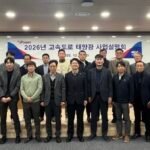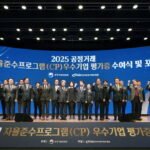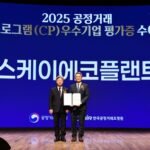POSCO Holdings President Jeong Ki-seop (left) and Argentina’s Economy Minister Luis Caputo pose for a photo after talks on lithium business cooperation in Buenos Aires on June 12, 2024
POSCO Holdings Inc., the parent of South Korea’s top steelmaker POSCO, aims to clinch additional deals from Argentina and Chile to secure lithium, a core electric vehicle battery material, amid a growing global trend of resource nationalism.
Jeong Ki-seop, president in charge of POSCO Holdings’ strategic planning, last week met with Argentina’s Minister of Economy Luis Caputo in Buenos Aires and discussed issues of mutual concern, the Korean company said on Monday.
During the meeting, the POSCO chief requested that the Korean company’s lithium business be included in Argentine projects to provide foreign investment firms with incentives, including tax breaks and state subsidies.
In response, the Argentine minister said he would create a favorable investment and business environment, including infrastructure and licensing support, according to POSCO.
HOMBRE MUERTO LITHIUM LAKE
POSCO Group, which operates a battery materials business through its affiliate POSCO Future M Co., has been striving to transform into a low-carbon conglomerate by shedding its decades-old image as a major corporate greenhouse gas emitter.
A POSCO-operated pond in Argentina that holds lithium hydroxide extracted from the Hombre Muerto salt lake
POSCO, Korea’s fifth-largest conglomerate, is particularly setting its sights on battery materials to overcome a growing trend of trade protectionism.
In 2018, the group acquired the Salar del Hombre Muerto Salt Lake in northwest Argentina and is building lithium-producing facilities with an annual production capacity of 50,000 tons, enough to make batteries for 1.2 million EVs.
The first lithium hydroxide plant with an annual production capacity of 25,000 tons is slated to come online by the end of this year. The construction of the second plant with the same capacity will be completed next year.
Sources said POSCO Group is also considering a third plant with a capacity of 50,000 tons in Argentina.
Lithium hydroxide is extracted from saltwater or ores and used along with high-nickel cathode material for EV batteries. A battery cell high in nickel content offers longer mileage and shorter charging time than existing batteries.
POSCO’s groundbreaking ceremony for its lithium plant in Argentina in 2022
LOOKING FOR OPPORTUNITIES IN CHILE
POSCO President Jeong flew to Santiago on Friday to meet with senior mining ministry officials for talks on joint development of salt lakes.
Chile has been actively seeking foreign investment in its government-led lithium lake development projects after President Gabriel Boric announced the National Lithium Strategy in April last year.
Meeting with Chilean mining ministry officials, POSCO’s Jeong stressed that the Korean company is the optimal business partner for the country’s lithium projects, given its track record of developing lithium lakes.
POSCO’s lithium plant near the Salar del Hombre Muerto salt flat in northern Argentina
Government officials asked Jeong to participate in two major lithium development projects in the Maricunga Salt Flat and the Altoandinos Salt Flat, according to POSCO.
While promising active government support, the officials also requested POSCO to invest in Chilean projects to expand its EV battery materials supply chain.
“We want to use the ‘chasm’ or the recent slowdown in the global EV uptake and mineral price declines as an opportunity to buy good assets such as lithium lakes and mines cheap,” said a POSCO executive.
POSCO Holdings Chairman and CEO Chang In-hwa said in April he would actively seek mergers and acquisitions in promising sectors beyond the steel and battery materials within his three-year term to secure new growth engines.
By Hyung-Kyu Kim
khk@hankyung.com
In-Soo Nam edited this article.















